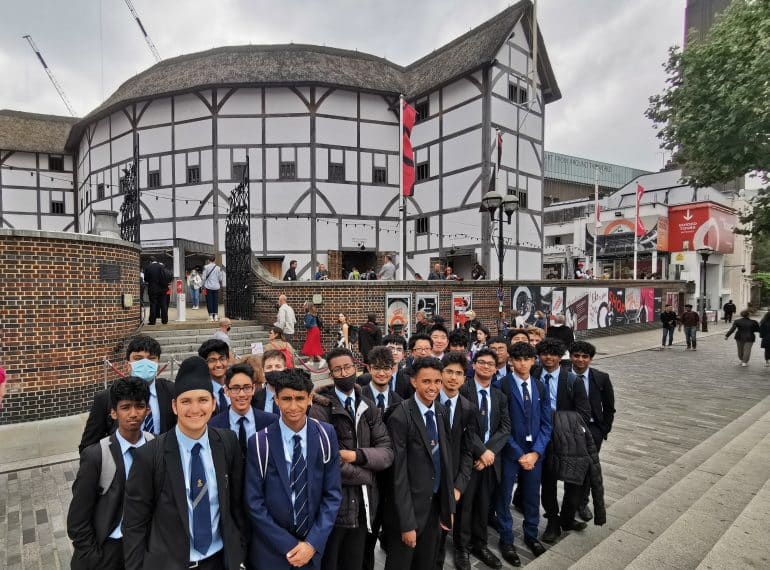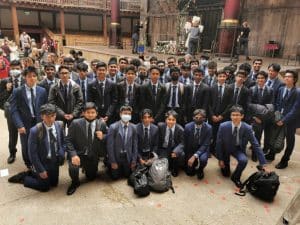Preventing tragedy: learning the lessons of Romeo and Juliet

Year 11 boys had the chance to see one of their GCSE English Literature texts brought to life when they went to The Globe Theatre to watch an “exceptional production” of Romeo and Juliet.
 During the visit – QE’s first live theatre visit since before the pandemic – all of Year 11 experienced a radical take on Shakespeare’s tragic tale of two young Italian ‘star-crossed lovers’ that eschewed romance in favour of an unsparing focus on mental health.
During the visit – QE’s first live theatre visit since before the pandemic – all of Year 11 experienced a radical take on Shakespeare’s tragic tale of two young Italian ‘star-crossed lovers’ that eschewed romance in favour of an unsparing focus on mental health.
English teacher Micah King said: “I’m so glad our students got to enjoy live theatre after two years of disruption. They were able to experience an exceptional production of one of their GCSE texts, in a reproduction of the theatre it was originally performed in.
“Magic happened there: the students were simultaneously transported to Elizabethan era Verona, while the exceptional cast brought a 400-year-old play to life and made its themes modern and relevant to our 21st Century students.”
The performance, directed by the critically acclaimed young British theatre director, Ola Ince, explored the impact of emotional abuse and family feuds on the wellbeing of the eponymous lovers.
One notable addition to the Elizabethan-style architecture of the Globe Theatre was an electronic billboard at the back of the stage, displaying messages such as ‘20% of teenagers experience depression before they reach adulthood’ when Romeo is introduced ‘with [his] tears augmenting the fresh morning dew’, and “The rational part of the young person’s brain is not really developed until age 25”, displayed as Friar Lawrence marries Romeo and Juliet in secret.
 Throughout the play, the boys stood in the theatre yard, or pit – the area which in Elizabethan times was the cheapest part of the theatre, with no seats provided. “This meant that sometimes the actors were moving between groups of students as they performed,” said Mr King.
Throughout the play, the boys stood in the theatre yard, or pit – the area which in Elizabethan times was the cheapest part of the theatre, with no seats provided. “This meant that sometimes the actors were moving between groups of students as they performed,” said Mr King.
The production, which stars Alfred Enoch as Romeo (best known for playing Dean Thomas in the Harry Potter film series and Wes Gibbins on the ABC legal drama television series How to Get Away with Murder) and National Youth Theatre-trained Rebekah Murrell, features modern sets and costume.
The Guardian’s reviewer, Arifa Akbar, who gave it four stars out of five, wrote: “…the love story is radically undercut and Ola Ince’s production is recalibrated to focus on Verona’s pervading social sickness and gang violence (there are not only knives but drugs and guns) as well as youth disillusionment and trauma.” She also praised the band as “the runaway highlight of this production”.
 For his part, TimeOut’s Andrzej Lukowski’s said: “…I thought the billboard was an interesting idea in a mercurial show that often manages to be frustratingly dysfunctional and giddily fun at the exact same time….Essentially Ince’s desire to offer up two hours of hard-hitting social realism and two hours of wild escapist fantasy at the same time is not entirely reconcilable. Kitchen sink regietheatre* isn’t really a thing. But just because it doesn’t always ‘work’ doesn’t mean it’s not good: I loved the wild, irreverent roar of the ball [the scene in which Romeo first sees Juliet]; equally, I think Ince is on to something in choosing to earnestly highlight the number of references to suicide in the play – it seems quite reasonable to interpret the star-cross’d lovers as being depressed.”
For his part, TimeOut’s Andrzej Lukowski’s said: “…I thought the billboard was an interesting idea in a mercurial show that often manages to be frustratingly dysfunctional and giddily fun at the exact same time….Essentially Ince’s desire to offer up two hours of hard-hitting social realism and two hours of wild escapist fantasy at the same time is not entirely reconcilable. Kitchen sink regietheatre* isn’t really a thing. But just because it doesn’t always ‘work’ doesn’t mean it’s not good: I loved the wild, irreverent roar of the ball [the scene in which Romeo first sees Juliet]; equally, I think Ince is on to something in choosing to earnestly highlight the number of references to suicide in the play – it seems quite reasonable to interpret the star-cross’d lovers as being depressed.”
* Definitions: Kitchen sink realism, which developed in the late 1950s and early 1960s, featured a type of social realism showing the harsh domestic lives of working-class British people. Regietheatre is the modern practice of allowing a director to determine how a play is put on, so that he or she need not adhere to the playwright’s specific intentions or stage directions.
